ON PROGRAM! Readers will hold position while I share some thoughts on the first season of Andor.
The terms “Star Wars” and “maturity” have largely been at odds with each other since 1977. To some, including Lucas himself, this was arguably part of the appeal. The original film was after all largely inspired by fantastical but silly epics such as Sinbad and Flash Gordon, and a cynic would argue that A New Hope is simply the next step up in technological achievement from those films. I am not so cynical, but I will forever cherish the original trilogy for what it is: a largely innocent adventure. While they feature a variety of accessible themes such as bravery against insurmountable odds, the redemption of evil, and the occasional accidental sister kiss gravity of family history, few of these subjects truly reverberate with us on a personal level. Indeed, after the “darkest” moment of A New Hope (the destruction of Alderaan), Leia Organa seems barely disconcerted by the time Luke arrives to rescue her. “Aren’t you a little short for a Stormtrooper?” she asks. Uh yeah lady I guess but…I’m glad you’re able to crack wise when all of your family, friends, pets, house, and entire childhood were just vaporized. The viewer feels nothing either, the loss of our entire planet after all is too ridiculously large scale of a tragedy for any of us to empathize with, and thus we breeze right by it so we can move the plot along.
From the prequels through today there were ups and downs (and downs) in terms of entertainment value but it rarely ever gets much more relatable than your average soap opera. There are some notable exceptions. Luke’s sense of failure in The Last Jedi and the struggles of (pseudo) parenthood in The Mandalorian are feelings many can empathize with but there was not as yet any Star Wars media that truly reflected the anxieties, tedium, and tragedies of everyday life as a human on Earth.
That is, until we got Andor.
Be forewarned, given our target audience I’m going to assume most of our readers have already caught up on the show by the time this releases, and thus this review WILL CONTAIN SPOILERS THROUGH THE ENTIRE SEASON INCLUDING THE FINALE.
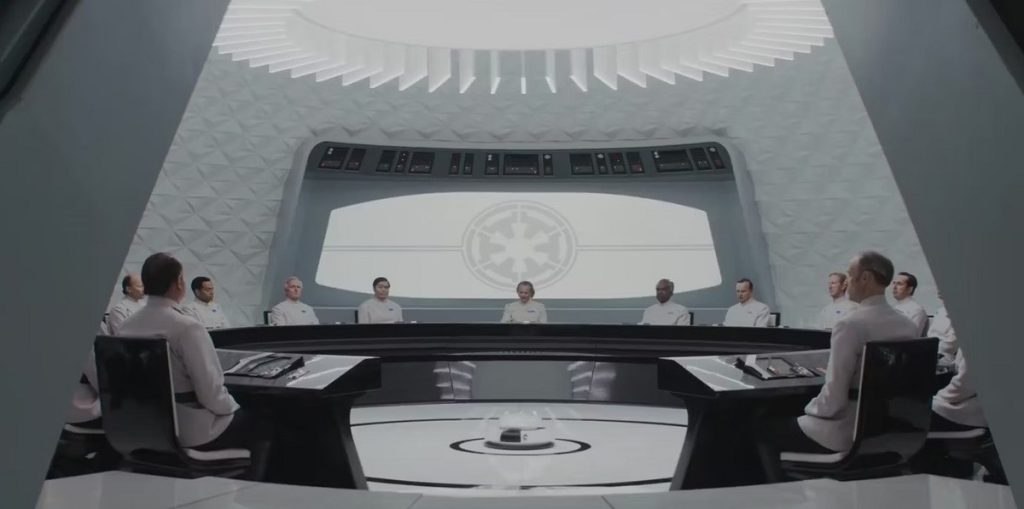
Oceans and Alleys, Dust Bowls and Highlands
Unlike some other science fiction series, Star Wars can’t get away with 70% beeping ship interiors and 30% caves made of foam and plaster. The planets and cities are of paramount importance to this universe and this show delivers magnificently on displaying some new ones along with a bit of familiarity. What’s more, the locales of Andor stand light years apart from the majority of others in Star Wars from The Phantom Menace and beyond. Much has been made since the first season of Mandalorian that “The Volume” represented an evolution of the “green screen malaise” that famously plagued the acting of the prequels. Thanks to this technology, the characters in more cgi-heavy shows like Mandalorian and Obi-Wan Kenobi are able to somewhat believably interact with the world around them, they can see the same aliens and vistas that the audience will down the road and thus interact with them more believably. Yet, throughout this era of CGI I’d say that the three settings that stand out the most to me were: Naboo (Lake Como, Italy), Scarif (Lamu Atoll, Maldives), and Atch-To (Skellig Michael, Ireland). Perhaps someday CGI landscapes will truly mimic what reality can bestow, but I doubt it will be in my lifetime, the difference to me is unmistakable. Star Wars just plain looks better when it’s filmed on-location.
There is little doubt Andor’s Ferrix and Aldhani now join the ranks of memorable places. Ferrix’s use of a real life oil refinery and quarry in England gave it a believable “weathered” look, and I’d wager Scotland will make millions in tourism spending as this show introduces the Scottish highlands (including a real-life dam that memorably served as the backdrop of the season’s best episode) to the otherwise-uninitiated in the form of Aldhani. I’ve not yet been there myself and I’d seen them a time or two on whiskey commercials, but Andor convinced me to put it on my bucket list for sure.
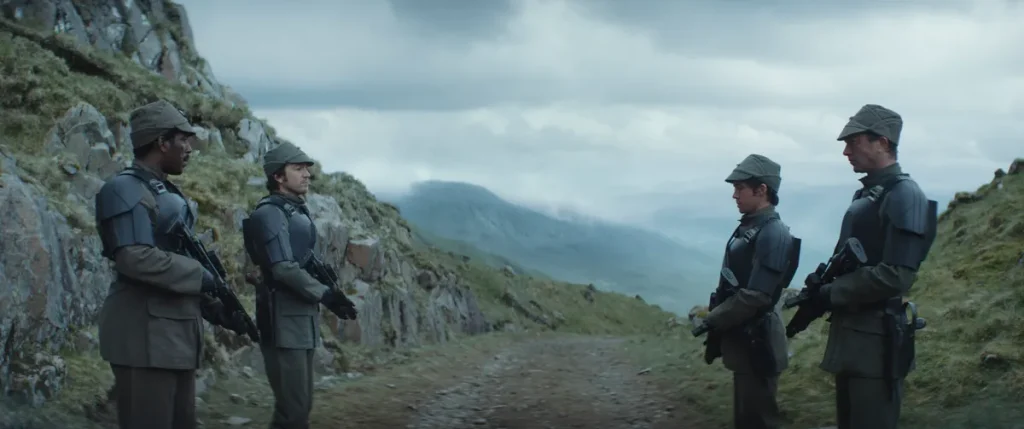
Not even Skeen can ruin such a pretty landscape. Skeen sucks.
Crucially, however, showrunner Tony Gilroy and the various directors and writers filled in the gaps that so often exist on Star Wars planets by taking time to consider their culture and history in dozens of little ways that together paint a cohesive picture. In the time spent leading up to the excellent heist in “The Eye,” Vel, Tarmyn, Skeen, and Gorn provide little snippets here and there about how the Empire has squeezed the life out of the Aldhani people over time. Commandant Jayhold Beehaz boasts to the visiting Colonel that this year is the last one the “locals” would be allowed to participate in what was obviously a central element of their faith, which rang to me as a reference to the illegalization of Native American religious practices “championed” by America’s federal government in the late 1800’s. On Ferrix, Gilroy tapped into the concept of a “mining town” that most people around the world find at-least familiar and asked the question: what if such a town was a lonesome colony on an otherwise barren planet for (presumably) centuries? The outpost serves the function of tearing technology apart to recycle its raw components that can be used to build anew in different forms. The varied sounds of a hammers banging on metal are used to communicate everything from a call to go to work from a kind of iron forge church tower to a warning that everyone needs to get inside, which interlopers are unable to translate for themselves. We even find that the spiritual motif of a cycle of construction and destruction extends to the ultimate degree: upon their death the most accomplished citizens are literally turned into bricks.
Though the penal colony Narkina 5 primarily takes place on a few tightly-designed sets it’s nearly as striking as the more natural environs. From the electric floors to the (usually) tasteless mush to the iconic distorted voice on their PA system, I was pleasantly surprised at how well Andor carved its own section in the little black book of fantastical prisons such as Azkaban or the Sky Cells in Game of Thrones. Even the five minutes we get on the surface provide some color: the local fishermen are falling on hard times because the Empire is polluting their fish to death, to the point that they act against their own personal interest to rescue runaways they had little in common with. This is reminiscent of multiple pockets of resistance to Nazi occupation during the Second World War, many acts of defiance were independent souls who would help victimized populations for no other reason than to stick it to their oppressors.
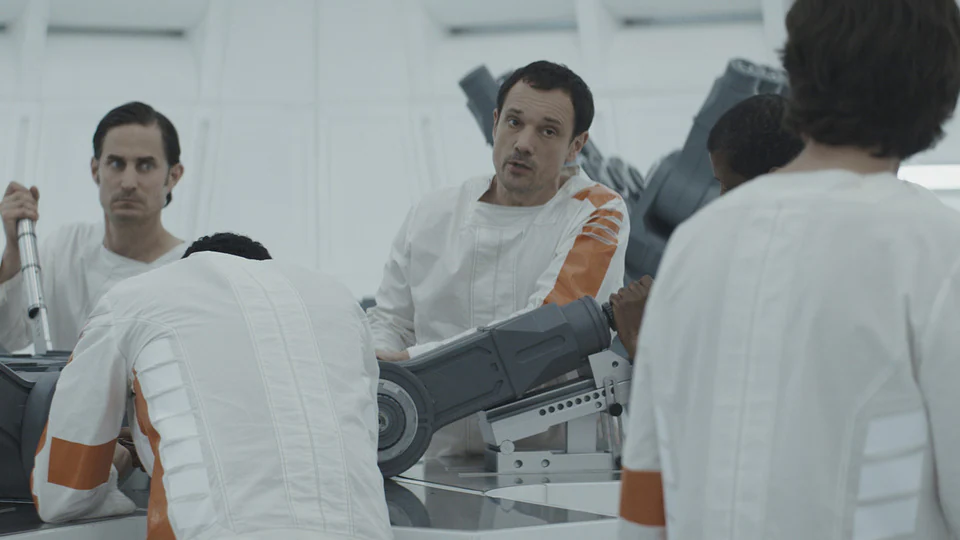
“You know Cass, you’re only ever gonna use a pistol in the fiction but people will always think of you as a sniper character”
Interlude: Be Still My Beating Heart
Ok, as a doctor I have to take an aside and comment a little bit about a few medicine-focused scenes in this season, for I am pleased to say they clearly hired at least a couple medical consultants. By the way, if you’re easily disturbed by real life medical problems you may want to skip this part:
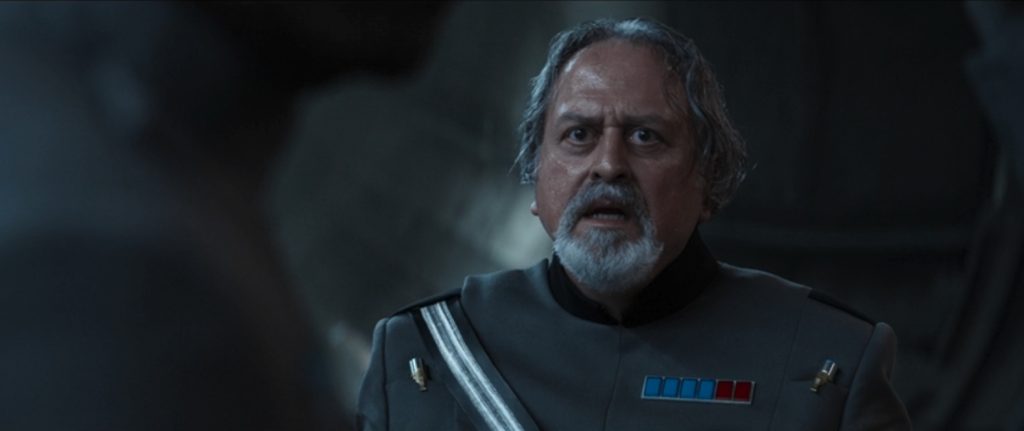
Commandant Jayhold Beehaz – Acute myocardial infarction (heart attack): This is the one nearest to my heart (heh) as I deal with it directly quite frequently. In an early scene his wife confirms that the overweight commander had become more-so recently (perhaps displaying metabolic syndrome) and after exerting himself under duress in a way that he likely had not done in decades he becomes extremely sweaty (this is the key, he does it way more than anyone else in the room) before clutching his chest and collapsing. We like sounding fancy so we say “diaphoresis” when “sweaty” is literally faster and shorter but all the same it’s one of the ways we can clue in to how urgently a patient needs to have their blood vessels opened up. Real life is usually more subtle than this but not always, this situation was totally believable. Verdict: Great
Karis Nemik – Traumatic intra-abdominal hemorrhage: Surely Nemik died from internal bleeding and lower paralysis would naturally follow from a crush injury like that but my real question is: What the hell was Doctor Quadpaw (great name!) doing operating on him lying on his side like that? Also, why was his back opened up? He’s dying from bleeding in his abdomen, perhaps that’s what should be operated on? Look, I get it, Disney has rules about blood and they wanted viewers to see his face, it’s fine. You know what actually makes me mad? Quadpaw isn’t wearing a single glove. Poor Nemik would have died of an infection later on anyway! Verdict: Unsafe surgical practice
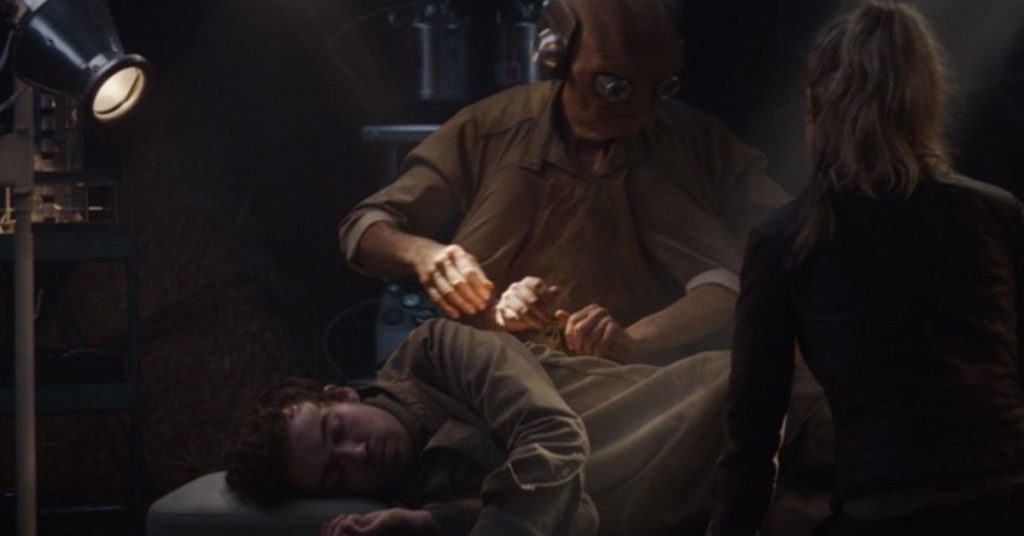
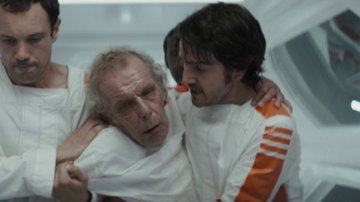
Ulaf – Acute ischemic stroke: A developing stroke isn’t always a sudden drooping face and one-sided weakness. The initial signs can be very subtle, sometimes they don’t express themselves as weakness at all initially but rather confusion, as we see here. What’s more, his symptoms develop over the course of a day, this is also very common timing in real life. His symptoms progress fairly appropriately, and eventually severe strokes can lead to brain herniation or death which is assumedly what happens to poor Ulaf as he experiences severe headaches, weakness, and coma. Verdict: Excellent
You Say You Want a Revolution Rebellion?
Those parallels with our own history are also unmistakable in the more organized forms of opposition to the Empire we see. The Rebellion in Andor echoes strongly of the French Resistance in World War 2 specifically, where multiple cells cooperate with each other (or sometimes, don’t) in a way that requires little dependence on any kind of central authority, nor does one really exist anyway. Mon Mothma at this time is really no more than a financier, oblivious to the real intentions of her benefactors, but even the more active bosses we see (Luthen Rael and Saw Gerrera) clearly have different MO’s. This mirrors the French methods of minimizing true inter-dependence, and also reduces the risk of exposure if one member gets caught.
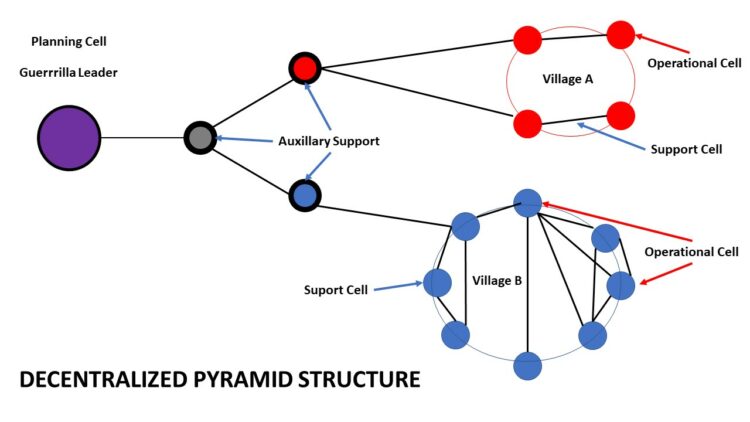
A diagram of French Resistance structure. Saw Gerrera hates 100% of the spokes that aren’t literally him…or maybe Benthic Two-Tubes or as they they call him France, Monsieur Deux Tuyaux
Andor had a well established canon (part of which he helped create in Rogue One) to draw off for this concept of a loose fractured alliance, but this show took that concept to the next level. This even extends to the degree Luthen is willing to push his morality when he blatantly sacrifices Anto Kreegyr to the proverbial wolves in order the preserve the cover of his insider in Imperial intelligence. He’s right to value a source on the inside at least, in 1941 the United States had one single double agent who the Gestapo thought they owned via blackmail. Through that agent, American intelligence basically wiped out Germany’s entire spy network within the US before they even officially joined the allies in the war. When you can get results like that, one could see why (to a Machiavellian revolutionary anyway) he’d be worth the lives of fifty allied scrubs led by a brutish fool.
Andor excels in displaying a harsh reality: that the concept of “Rebellion” is much more complicated than telling stories about farm boys who became dashing pilots serving the forces of good. Some of you may be as surprised as I was to learn that Luthen and his involvement with the raid on Aldhani was largely based on a famous (in Russia anyway) bank robbery that took place in 1907. This robbery ended up being an important step to funding the Bolshevik revolution, and was masterminded by none other than Joseph Stalin, and executed by one of his top lieutenants. While I think it’s fair to say that the Empire is a bit more of a clear-cut “evil power” than Tsarist Russia, Andor is keen enough to point out the far-reaching consequences of violent action no matter how “righteous” one thinks a cause may be. Though it’s only given a moment of time before never being mentioned again, Luthen listens to a radio transmission that confirms hundreds of Aldhanis were brought in for questioning after the raid, one wonders if any adult in that village didn’t up getting arrested, tortured, or executed in “retaliation” for something they had nothing to do with, another concept that unfortunately hails from our own history. Luthen admits to Mon that he’s glad for this; after all Che Guevara noted himself in his book on guerilla warfare that it can’t ever achieve its ends if the common people aren’t on their side. A little bit of suffering at the hands of a common oppressor goes a long way to get folks on your side.
This butterfly effect of violence is another recurring theme of the show. Cassian is on Morlana One looking for his sister (a plot point I question we’ll have sufficient time to explore in Season 2 with everything else going on) who he was separated from as a direct consequence of the Clone Wars. In doing so, he kills one corporate security officer in an accidental act of self-defense, then murders one in cold blood to cover his tracks. This leads directly to the corporate raid on Ferrix, which leads to Cassian skipping town with Luthen (there’s no way he would have if he had a choice) which led to his skill-set enabling Aldhani’s success, which led to retaliatory arrest and prison sentence extension of which he himself unwittingly ended up on the receiving end of.


Child-abducting bank robber or “spoiled rich girl?” It’s all in the hair
Vel experiences an aspect of this as well, when she finds out that her raid tightened Imperial observation of her cousin’s finances which in turn led to Mon Mothma’s daughter (presumably) getting married off to the son of a mobster, in a tradition that Vel herself despises. I wonder if in Season 2 Cassian and Vel will reconcile with the people who suffered (Poor Bix, goodness) and died as a result of their actions. The Cassian we see in Rogue One is clearly not one who has mended his violent ways, he starts the movie off by murdering a friendly informant to cover his own tracks after all. Perhaps he, like Luthen, has convinced himself that he has to accept being damned to further a righteous cause.
Interlude: In Space, All Warriors Are Cold Warriors
I know that’s a Star Trek quote, leave me alone game respect game after all. Let’s take a break for a little levity before the home stretch and rank the supposed teammates and/or defenseless people Cassian has killed (so far) in order of the necessity of the act:
- Skeen: Screw that guy, he should be ranked one all the way through a hundred here
- Friendly But Injured Informant in Rogue One: It sucks but actual planets were on the line and Cassian knows from talking to Bix that the Empire will just play “Now That’s What I Call Dying Alien Children: Volume 6” and it’ll all be over for the Rebellion
- That Saw Gerrera soldier who was gonna throw a grenade at Jyn in Rogue One: Hey man gotta protect your own, sucks for the other Saw dudes the grenade fell on though, Tubes was so pissed!
- The Fat Corporate Security Officer: Literally an act of theoretical self-preservation
- The Prison Guard on Narkina 5 after he was disarmed: Completely unnecessary, though maybe it’s better than letting him get beaten or trampled to death
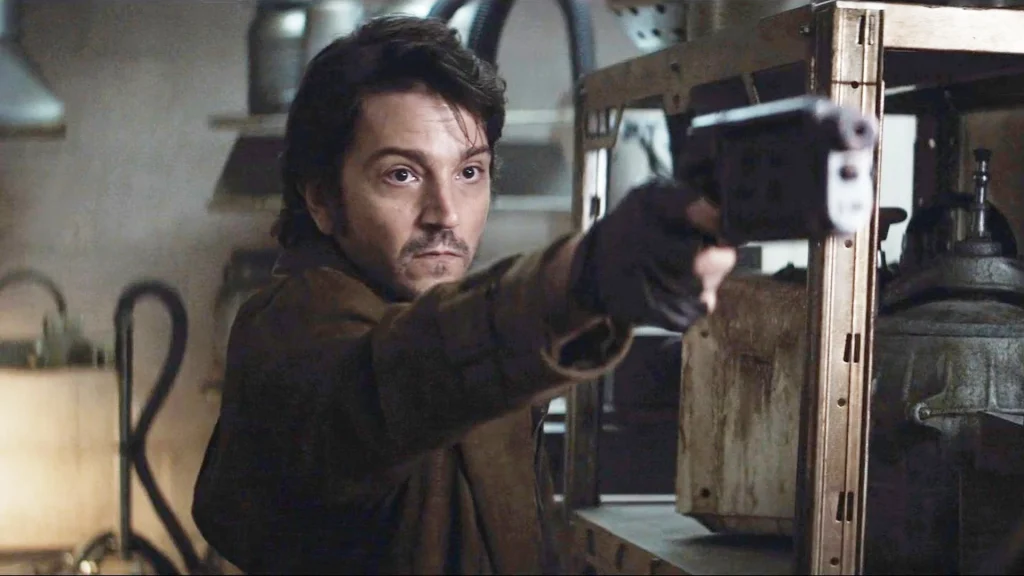
“Sir I’m sorry the pizza was a little cold, traffic w-” and then BLAM, you just got “Andor’d”
A Word is Worth a Thousand Pictures
While the setting and the echoes of real-life events in world history make Andor stand apart from other works in the franchise, I doubt there’s any element of this show that stands above the crowd more than two of the most fundamental cornerstones of literally any work of fiction.
Characters, and dialogue.
I unequivocally think this show can be enjoyed by just about anyone. My personal case-in-point is my wife, who is a Star Wars fan but a much more discerning one than me (she, being a normal person, couldn’t tell you that the T-16 skyhopper, T-47 airspeeder, and T-65 X-wing were all made by the same fictional corporation like I could). She couldn’t finish Mandalorian because it didn’t interest her all that much and I actively told her not to watch Book of Boba Fett because I was afraid it would convince her the franchise has literally died. But with Andor she was instantly hooked, and I think the key is that it features characters that are three dimensional with complex and relatable motivations.
Mon Mothma is a perfect example. We are fortunate that George Lucas picked Genevieve O’Reilly to play a younger Mon in a deleted scene in Episode 3. The directors of Rogue One certainly could have picked another actress for her but they did not and we reap the benefit of that with this show. Though Mon is initially no more than a financier, she finds herself getting deeper into the mud as time goes on. It seems that she views the Rebellion as a font of purpose in her life, a distraction from a husband she never loved, a daughter who doesn’t look up to her, and a Senate that never listens to her. Eventually she finds out that she’s in too deep, and feels that she needs to make an impossible choice. Gilroy is smart to point out via dialogue that Mon’s husband Perrin is (despite his other faults) not some ultra-conservative proponent of Chandrilan marriage practices, so if her daughter (presumably) ends up getting sort-of sold off we as the audience know that she truly is the only one to blame. Some would argue it’s a tough choice she makes for the greater good, others would argue (like me) she had no right to embroil her daughter in all this. But no matter what way you slice it, Mon has to make actual choices in a way that we haven’t seen before in Star Wars: one that isn’t “black and white.”
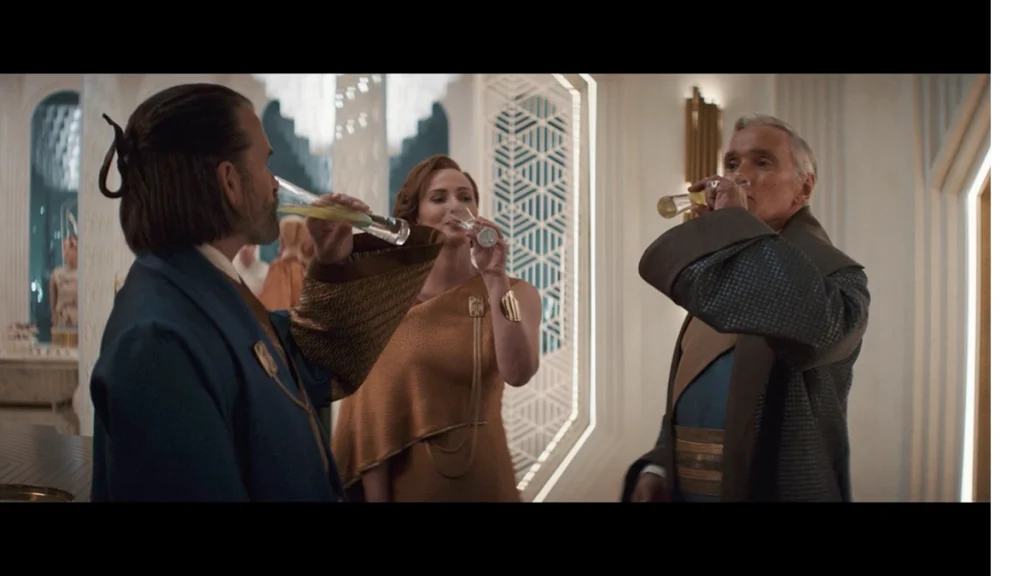
I don’t care if there’s worms in it, I’d still take it over White Claw
Speaking of moms, who would have believed it if they heard that this Star Wars TV show would feature a main character who is forced to return home to live with his mother after he’s fired from his job? Syril Karn is a contemptible wannabe fascist right from jump, one whose insecurity made him somewhat of stand out in the Star Wars universe full of dashing heroes, joking smugglers, and cold-hearted villains (though Director Krennic was a half-measure in that direction). When we meet his mother, however we see exactly why he ended up the way he did. At one point she guilts him for disappointing her and lists the meals she prepares (blue milk cocoa puffs, lots of work!) as a reason for why he should feel terrible, I actually felt a pang of sympathy for the guy. I’d say most of us went to school with a kid like Syril, he was doomed from the start.
Syril is a super-fan/stalker of Dedra Meero, another slam dunk of a character. Dedra introduces herself by exemplifying the kind of belittlement and inspiration-of-doubt that many professional women experience every day in our society. She is clearly better at her job than Blevin or most of the other officers; she has an extraordinary attention for detail and she bothers to ask pointed questions of Syril Karn when Blevin just spits on him for making the Empire look bad. She also has to work with a lot of idiots, from the sleepy desk clerk to the boastful chest thumping morons of Imperial leadership that are installed on Ferrix. The way she subtly rolls her eyes at the incompetent men she has to deal with, and at Syril’s encroachment towards her (which she clearly recoils from), is outstanding. By the way, it’s notable that Denise Gough and Kyle Soller are both primarily stage actors who Tony Gilroy scouted in English theaters to pick them for his characters. He made excellent choices, and the way the show hardened our view of Dedra (her behavior toward Bix confirms what we already should have guessed: that she’s a fascist psychopath who leaps at the chance to give a woman life-long PTSD just to make a point) and softened our view of Syril (by exposing us to his mother) created an interesting dynamic between them. In their last scene together, I found myself uncomfortable in a weirdly enjoyable way, it’s hard to describe but I’m now eager to see where this messed up relationship leads from a popcorn perspective.
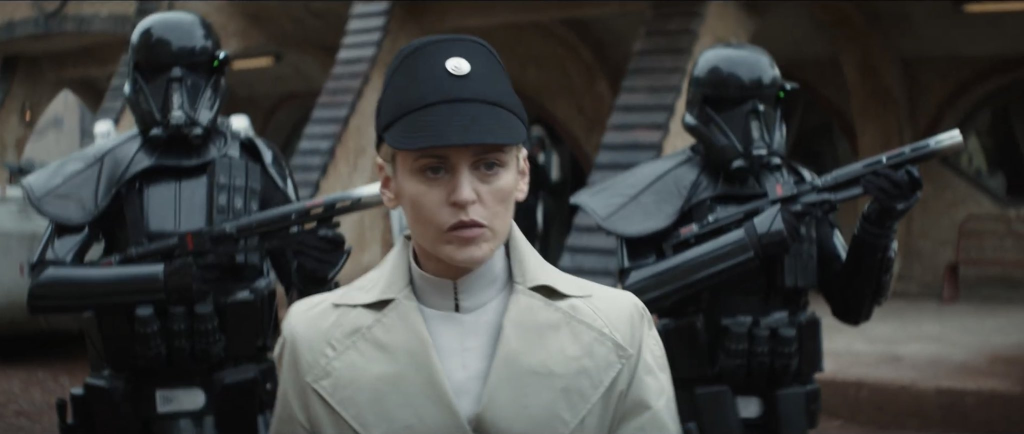
“I could kill three times as many men if they gave me guns like that”
There are too many other characters to highlight for me to really give them justice. Gorn has his own tragic story that’s mostly based on conjecture and us filling in the blanks, but effectively so. Bix demonstrates an impressive loyalty for her friends, and pays for it with a mind that will permanently be haunted by the dead. Nemik is a lovable but also kind of foolhardy idealist, I went to college with about a thousand Nemiks. Lonni Jung, Luthen’s inside man, goes from being some dude in the background to an object of sympathy with just a few lines of dialogue. Cinta is the scariest character in the show, she just happens to be a Rebel, part of me wondered if she had poisoned Maarva to draw Cassian out.
And it’s dialogue that I want to end the bulk of this praise-party with. Not all of it is what I would call “realistic” for the way people talk in real life: Kino Loy’s speech could be right out of Spartacus, Luthen’s hallway monologue may as well be a villain bit from Richard III, but it legitimizes these forays into melodrama with excellent writing. However, throughout the rest of the show I was struck by the way the directors got these characters to speak to each other in ways that made us feel their relationships through their words. The crappy passive aggressive husband-and-wife talk between Mon and Perrin is surely the best example of this but I’d also like to highlight the Imperial clerk who can’t figure out how to address a woman who is his superior officer, and the discussion amongst the Ferrix natives who were worrying together about Maarva in Cassian’s absence. Anyone who has had a frail elderly family member with several friends in their community has heard similar talk, a sort of “circling of the wagons” that people do when age takes a particular toll on a mutual old friend. These little things are often extremely relatable to experiences we have in life or hear others recounting, and they bring us that much more into the story it’s trying to tell.
Rogue 0.5
Andor is, to my mind, the best Star Wars has been since the Empire Strikes Back. In a franchise that is normally about emperors, generals, and Chosen Ones it finds a way to be grounded. Perhaps this is antithetical to a series title “Star Wars” but I think a connection to the familiar is essential to quality fiction, and this show passes that test with flying colors. This isn’t to say that it’s perfect; I am concerned that this storyline with Cassian’s sister won’t have time to develop and I’m still unsure what the point was of Luthen visiting Saw to warn him about Kreegyr if the show’s plan was just to kill Kreegyr and his men off-screen anyway. But, after a start like this I am more than willing to give these talented directors, writers, and actors the benefit of the doubt as we wait what will likely be nearly two years for the second season. I’m a little sad that this has been confirmed to be the only follow up season, but I’m eager to see where it goes since Gilroy has mentioned that each 3 episode arc will cover an entire year in the story, leading all the way up to the very first shots of Cassian meeting his “soon-to-be Andor’d in the back” informant. One can hope that Disney sees the critical success of this show and takes it to heart for the future of the franchise. It’s unavoidable that we’ll get back to space wizards and death stars again, that’s just the flavor of Star Wars that some folks, maybe even most, prefer. But when we do, the shepherds of this series would do well to remember that a few teaspoons of the mundanity of everyday life and a dash of our actual shared history as human beings on Earth can lead to a batch of cookies that anyone can enjoy.
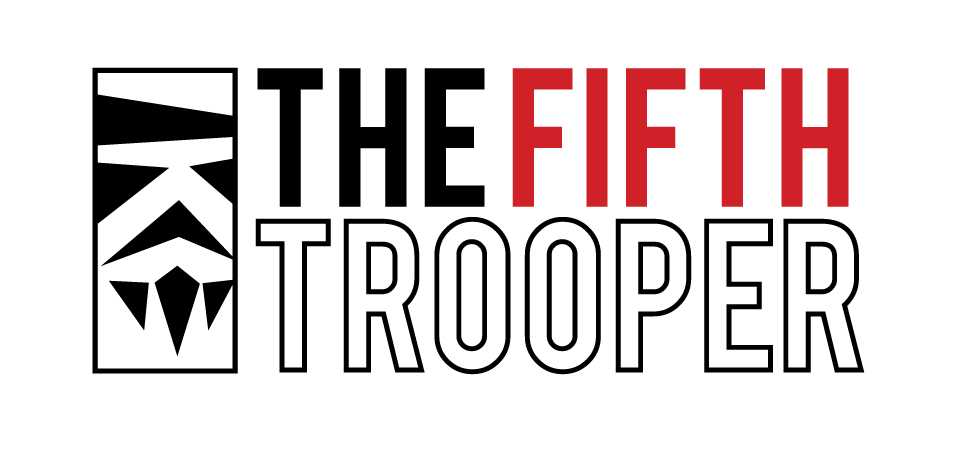
Lord have mercy this was a beautiful thing. Thanks. Shared it with my Princeton-PhD brother since it was so smart and likewise geeky.
Thanks David that’s so kind of you! I see you’re a professional author, this is really more of a hobby for me so it’s heartening that someone like you sees value in it.
I took the sister story as a deconstruction of the whole ‘hero’s journey’ Joseph Campbell stuff that is so rife in Star Wars. Cassian THINKS he is on a hero’s journey, and that the universe revolves around him (‘gotta save my sister!’) but he immediately botches his quest and it leads to him doing a terrible thing that sets everything else in motion. He does end up a hero, just not in a way he (or anyone really) would have wanted.
It makes me think of ‘Rosencrantz and Guildenstern are Dead’, where you take a background character from a narrative (he wasn’t even the main protagonist in Rogue One), one who we know from the start is doomed, and build a whole narrative around them, musing on fate and free will. Fewer jokes in this case. In other ways it makes me think of ‘Watchmen’: what if the ridiculous antics of these heroes took place in an even vaguely realistic world? What would that look like? Luke and Darth, the beautiful and ‘bad ass’ chosen ones, seem so far away they might as well be propaganda inventions. Here we see all the regular people who have to be ground into the dust so that Luke can stop being a farm boy and blow up the Death Star two days later with hardly any effort and almost no emotional consequences. He gets the privilege of the hero’s journey while the underprivileged suffer.
My only gripe would be that Cassian gets back from prison to the exact same place and picks up his gear and it’s like the whole prison stuff never happened. That all seems too easy. But of course the prison stuff is so key to the characterisation and themes that I’ll forgive it.
The original movies unintentionally glamorised fascism because the director happened to love WWII movie aesthetics. Lots of people get carried away with how ‘bad ass’ Vader is. Andor deconstructs all that. The Empire is at their most terrifying, and they’re mostly talking in board rooms. Andor even undermines the ‘Nazis have the coolest uniforms’ trope! Via Syril we see that even one’s tailoring choices can single one out as too grasping or over reaching. There are a million written and unwritten rules. Syril is a true believer and that doesn’t help – the Empire doesn’t care. It doesn’t want him. The Empire doesn’t care about anyone and it will eat its own and those who love it without a second thought. Every other character sends toaster droids scurrying away in terror – Syril has to step aside for one. Love it.
Such a great show. It changes the way you look at everything else in the franchise while still letting you have and enjoy everything else. People will be writing essays about it for years.